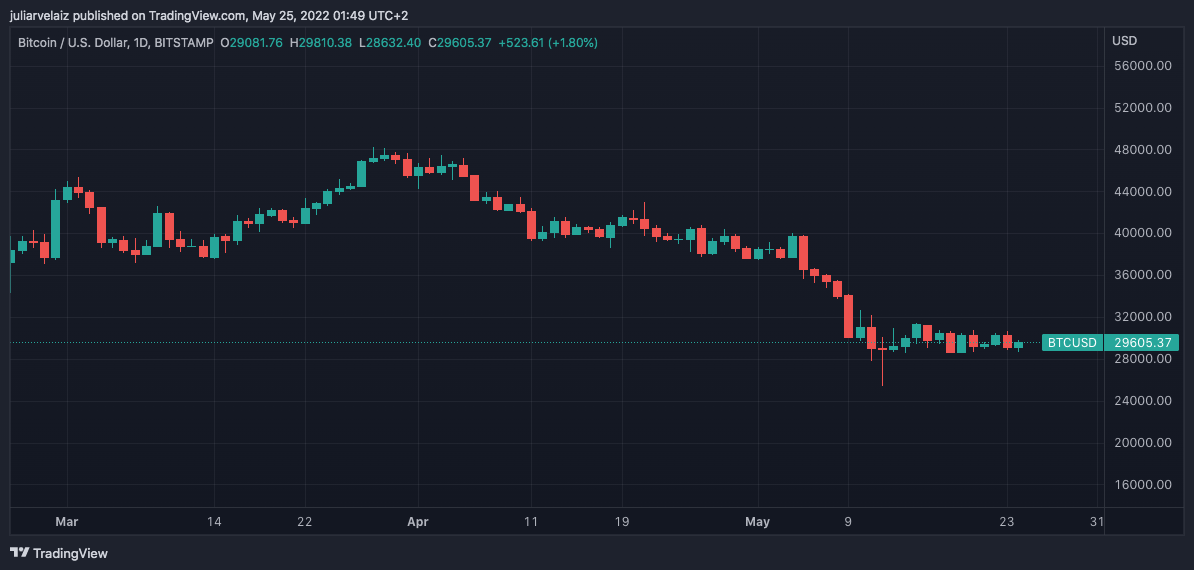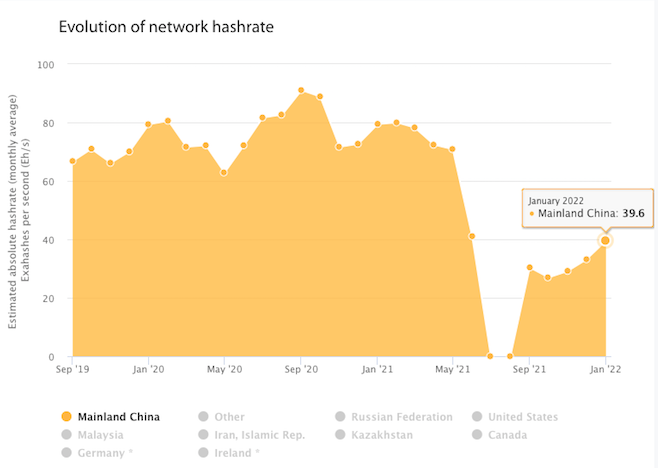China’s bitcoin mining ban of June 2021 might have backfired, being now a vivid proof of the network’s strength. Collected data reports an important regrowth within China itself. It seems like even this titan of authoritarianism has failed to ban bitcoin mining.

Bitcoin trading around $29k in the daily chart | BTCUSD on TradingView.com
Post-Ban Activity
China’s crackdown was a hard blow, but about 9 months ago the total BTC hashrate had already started to climb back up recovering 68% to pre-ban levels as China-based miners moved to countries that were seemingly friendlier to the crypto mining activity –like Kazakhstan and the United States–, and other powerful miners increased their activity.
Back then, Pantera Capital even argued that “The transition to renewables is well underway” as it was possible –although not certain– that “much of the reboot in mining power is occurring in places with cleaner energy than those utilized by Chinese miners.”
The network eventually fully recovered.
However, according to data by the Joule Journal, the miners that exited China have not found more sustainable ways to continue their operations elsewhere, and the carbon footprint only seems to have gotten worse.
Allegedly, the renewable energy used by bitcoin miners fell from 42% in August 2021 to 25% at the beginning of 2022. The reason behind this seems to be that many of the miners moved from using China’s hydropower to using energy mixes from new locations that rely primarily on hard coal, like Kazakhstan’s.
However, the scenario –like Kazakhstan’s recent political turmoil and latest taxation proposal– and the global share of the Bitcoin hashrate continue to shift and we are yet to see how the environmental scenario develops.
Related Reading | As Bitcoin Mining Difficulty Hits 5% ATH, Majority Of Miners Shift To Ethereum
Not Even China Can Ban Bitcoin Mining
The shifts don’t stop in Kazakhstan. The latest data from Arcane Research reported how, despite all efforts, mainland China still hosts a significant share of the BTC mining industry. “Does this prove that banning bitcoin mining is impossible?” the report wonders.
The question comes as the Cambridge Index has updated its data to new surprising numbers that show growth in China’s BTC mining activity:

China miners now produce 21% of the total BTC hashrate. This is still a big 46% decline compared to the numbers before the ban, but a significant increase from that 0 EH/s void that caused temporary panic in 2021 thus affecting the coin’s price. China is back to production levels higher than Kazakhstan’s.

As the report notes, all of this 21% of hashrate is being illegally produced. Again, China’s ban serves as proof of how resistant the BTC network and its miners can be. It first recovered from the big drop as other locations didn’t sleep on its profitability, and it has now even resisted “one of the world’s most authoritarian governments.”
Related Reading | The New China: Is New York Actually Going To Ban Proof-Of-Work Mining?
“Why has China failed in banning bitcoin mining? Although political power is very centralized in China, the country’s vast size makes it challenging to implement a ban on bitcoin mining, which is often done in very remote locations where there is excess energy available,” Arcane Reserach explains.
The report further adds that “the ban also clashes with local economic interests,” because the gains of monetizing local excess energy by mining bitcoin have “heavily incentivized” Chinese local governments to cooperate with the activity.
Knowing how the Chinese government usually operates, new crackdowns on illegal operations are to be expected, but this significant growth mocks their previous efforts, which could also take away strength from similar proposals to ban proof-of-work mining around the world.
“China has attempted to ban Bitcoin nine times before, targeting financial institutions, crypto exchanges, and miners. This is just the latest failure in their increasing streak of Bitcoin ban attempts.”











